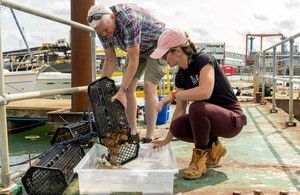European flat oysters are being reintroduced to the Solent through a joint MOD conservation project aiming to boost marine life and help clean the waters of the strait between the Isle of Wight and the Hampshire coast.
It is hoped that the re-introduction of 2,000 oysters to the area after nearly half a century will encourage marine life back to heavily-used waters – the Royal Navy’s vessels form part of 130,000 movements per year around Portsmouth Harbour.
Several oyster crates have been installed by the project team on pontoons at the southern end of Whale Island to grow juvenile oysters – in a bid to re-establish a healthy population of the native species.
The initiative, known as the Whale Island Native Oyster Restoration Project, is a collaboration between the Salvage and Marine Operations (SALMO) Wrecks team, part of the MOD’s Defence Equipment and Support (DE&S) organisation; the Royal Navy; the Defence Infrastructure Organisation (DIO) and the Blue Marine Foundation (BMF) charity.
Harriet Rushton and Rod Jones inspect the European flat oysters, MOD Crown Copyright.
With £6,000 of funding from the Defence Infrastructure Organisation’s Conservation Stewardship Fund (DIO), the project was established and then managed for the Ministry of Defence by marine biologist Harriet Rushton, environmental manager for SALMO Wrecks who said: “These oysters are being grown for conservation, re-introducing a lost native keystone species in the Solent, which will enhance biodiversity and help clean the water.
This shows the Ministry of Defence’s commitment to improving the UK’s ecosystem and helping to address climate change, thus contributing to minimising climate and ecosystem pressures on MOD training and operations.”
The Solent was once the largest fishery in Europe for the flat (Ostrea edulis) oysters however in recent decades the species has been replaced by the invasive Pacific oyster (Magallana gigas), with potentially detrimental consequences to the local marine environment.
Rod Jones, the Royal Navy’s Senior Maritime Environmental Protection Adviser, believes if successful, there is potential for the initiative far beyond the Solent. He said: “If we can grow oysters here – which is far from an ideal environment as it’s a very industrial setting – then there are clearly opportunities to grow them elsewhere, other naval bases or MOD sites.
The Navy has been operating in the Solent for centuries so it is only right that we should be involved in protecting its environment.”
